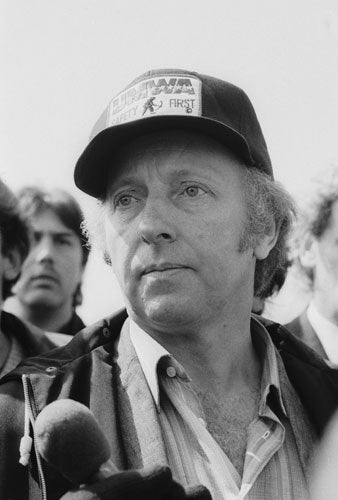Arthur Scargill joins striking rail workers on picket line
Arthur Scargill was former prime minister Margaret Thatcher’s nemesis

Your support helps us to tell the story
From reproductive rights to climate change to Big Tech, The Independent is on the ground when the story is developing. Whether it's investigating the financials of Elon Musk's pro-Trump PAC or producing our latest documentary, 'The A Word', which shines a light on the American women fighting for reproductive rights, we know how important it is to parse out the facts from the messaging.
At such a critical moment in US history, we need reporters on the ground. Your donation allows us to keep sending journalists to speak to both sides of the story.
The Independent is trusted by Americans across the entire political spectrum. And unlike many other quality news outlets, we choose not to lock Americans out of our reporting and analysis with paywalls. We believe quality journalism should be available to everyone, paid for by those who can afford it.
Your support makes all the difference.Arthur Scargill joined striking workers on the picket line on Tuesday as RMT hailed the “fantastic” turnout that “exceeded expectations” on the first day of the industrial action.
Mr Scargill was a thorn in former prime minister Margaret Thatcher’s side when he and other union leaders launched the miners’ strikes between 1984 and 1985 in protest at the government’s attempts to force pit closures.
Thatcher described the miners as the “enemy within” and refused to meet the demands from trade unions, while simultaneously mobilising the police and security state against them in order to implement her economic reforms.
She bested the unions and a wave of redundancies hit former mining areas in 1985 who have struggled to recover economically and continue to suffer from deprivation, as noted in the present Tory government’s “Levelling-Up” paper.
Despite the defeat, the 84-year-old, who previously ran the formidable National Union of Mineworkers (NUM), showed he has lost little of his enthusiasm for industrial action as he stood on the picket line in Wakefield.
Wearing his “safety first” hat, that was a feature of his time on the picket line in the mid-1980s, he posed for pictures with railway workers and held up RMT protest signs.
It comes as RMT boss Mick Lynch, who has previously expressed his admiration for Mr Scargill, branded the first day of the worst rail strikes in a generation, a success.
He said: “Today’s turnout at picket lines has been fantastic and exceeded expectations in our struggle for job security, defending conditions and a decent pay rise.
“Our members will continue the campaign and have shown outstanding unity in the pursuit of a settlement to this dispute.
“RMT members are leading the way for all workers in this country who are sick and tired of having their pay and conditions slashed by a mixture of big business profits and Government policy.

“Now is the time to stand up and fight for every single railway worker in this dispute that we will win.”
Only a fifth of trains ran on Tuesday and as half of all lines were closed and passengers who did try to make it in using rail services often faced journeys that lasted several hours longer than usual. The bitter dispute between the unions and Network Rail, and train operating companies is over pay, jobs and conditions.
A DfT spokesperson said: “These are desperately needed reforms that modernise the railway and put it on a sustainable footing for passengers and taxpayers.
“Unions have shut down big parts of the rail network, hitting local businesses and unfairly cutting people off from hospitals, schools and work.
“However, early data shows that unlike in the past many people now have the opportunity to work from home, so we haven’t even a rush to the roads, as traffic has instead gone online, which means the unions aren’t having the overall impact they might have hoped.”
Join our commenting forum
Join thought-provoking conversations, follow other Independent readers and see their replies
Comments